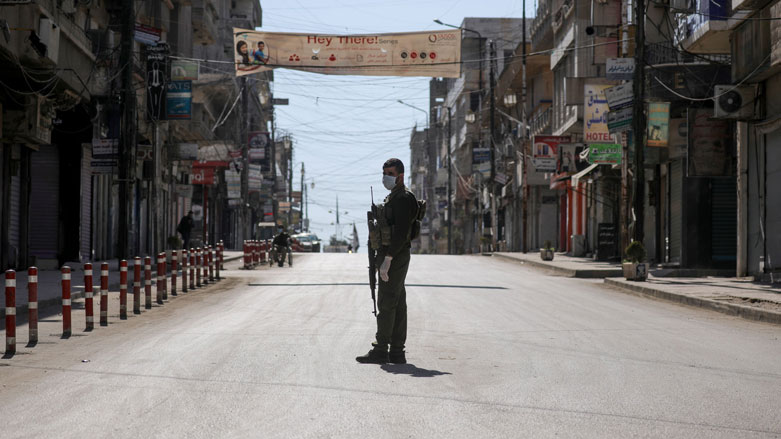Kurdish-led SDF calls for truce in Syria amid coronavirus pandemic

ERBIL (Kurdistan 24) - The Kurdish-led Syrian Democratic Forces (SDF) on Tuesday voiced support for UN Secretary-General Antonio Guterres’ call the previous day for a global ceasefire in order to focus on fighting the coronavirus.
“The General Command of the Syrian Democratic Forces declares its commitment to global efforts which aim to combat coronavirus with support and effective response to this situation,” the SDF Command said in a statement.
Based on this, the SDF leadership called on all parties in the Syrian conflict to refrain from military actions and make an immediate commitment to a humanitarian truce.
The appeal issued by Guterres on Monday urged warring parties across the world to lay down their weapons in support of the immediate battle against the coronavirus. Such a global ceasefire, said the UN, “would allow humanitarians to reach populations that are most vulnerable to the spread of COVID-19,” as the virus is officially named.
In its statement, the SDF underlined that its fighters would only defend themselves and against outside attacks and would avoid engaging in military actions.
“We hope that this humanitarian truce will help to open the door for dialogue and political solution and to put an end to the war in the world and Syria.”
The SDF warned that, as a result of Syria’s health system being ravaged by almost a decade of war, any renewal of hostilities would cause more displacement that would severely affect the remaining health infrastructure and lead to an increased spread of the virus.
Syria reported its first infection on Sunday. Up until then, Damascus has denied any cases in territories under their control, despite reports suggesting otherwise.
Read More: Syrian government quiet amid coronavirus outbreak
There have been no confirmed cases in areas under SDF control.
Thomas McClure, a Syria-based researcher at the Rojava Information Center, told Kurdistan 24 that this is likely because the local administration in the SDF-held northeast of Syria does not have access to a single testing kit.
The local administration has taken several precautionary measures to prevent the spread of the coronavirus pandemic such as closing the border crossing, shutting down public places, and imposing a curfew earlier this week.
Read More: Syrian Kurdish officials impose curfew to prevent coronavirus outbreak
McClure added that the situation is dire in the northeast, with 40 ventilators to serve a population of millions, underequipped hospitals, and Turkey cutting the water flow to thousands of civilians living in the northeast.
Read More: Turkish-backed group’s disruption of water puts 460,000 people at risk, UNICEF warns
“The Autonomous Administration of North and East Syria (AANES) has rightly recognized that coronavirus threatens to overwhelm the civilians living under their jurisdiction,” McClure said.
The Health Department of the local administration on Tuesday called on the EU, United Nations, the World Health Organization (WHO), and international organizations to provide medical aid to prevent a potential crisis.
Also, the International Rescue Committee (IRC) on Monday warned that the coronavirus in Syria could lead to one of the most severe outbreaks in the world. IRC spokesperson Misty Buswell warned in a public statement that, in northeast Syria, only one out of 16 hospitals is functioning at full capacity.
“(This) means that two of the three hospitals that have been identified to quarantine and treat suspected cases are not fully equipped.”
“There are only 28 beds available in Intensive Care Units across these three hospitals, only 10 adult ventilators, one paediatric ventilator - and only two doctors trained in how to use them.”
Syria-based researcher McClure stated to Kurdistan 24 that the SDF’s call for a ceasefire “throughout the Syrian conflict serves as an acknowledgment that, once again, it will be ordinary Syrians who suffer most if geopolitics are allowed to override humanitarian need.”
After Turkey intervened in northeastern Syria in October 2019, Russia and the US reached separate ceasefire deals with Turkey which allowed Turkey to control the area between Tal Abyad and Ras al-Ain. Despite the ceasefire deals, Turkish-backed groups continue to occasionally shell areas held by the SDF.
Read More: SDF officials deny ceasefire deal to stop fighting near Tal Tamir
As recently as Tuesday, Turkish-backed groups reportedly shelled SDF-held villages near Tal Tamir.
Moreover, Syrian regime reinforcements continue to arrive at the frontlines of Idlib, where a Russian-Turkish ceasefire deal in March halted weeks of fighting between regime and Islamist groups.
On Monday, the first anniversary of the liberation of the Syrian city of Baghouz, which marked the territorial defeat of the Islamic State, US Senator Lindsey Graham spoke with SDF head Mazloum Abdi to stress the importance of a continued US-SDF partnership.
Read More: Sen. Graham: US must continue partnership with SDF against ISIS
“Concern was expressed about Russian aggression along Turkey-Syrian border,” Graham added in his tweet, “and potential efforts by Russia to grab oil,” said Graham in a tweet that described the call, highlighting the complex security situation in Syria that often includes international actors with their own interests.
“Unfortunately,” McClure concluded, “we are unlikely to see the desperately-needed ceasefire materialize.”
Editing by John J. Catherine
